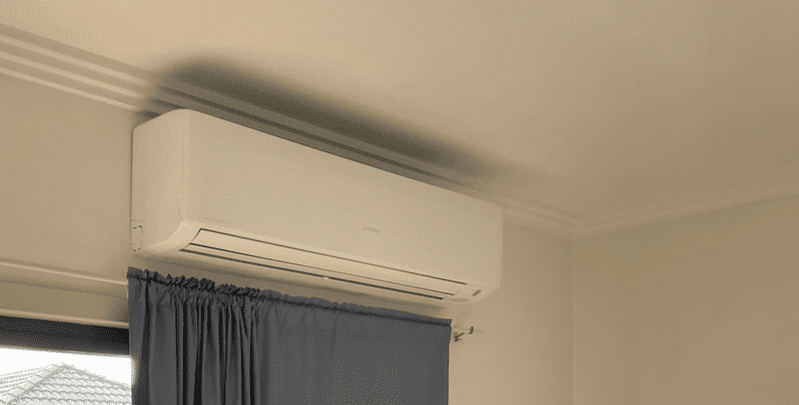Picture this. You plonk yourself down on the couch to watch a movie on a Saturday afternoon. There’s more than a touch of warmth in the air, so you decide there’s no better time than now to whack on the old split system air con. You grab the remote, turn it on, and discover the last thing you want to find. Your aircon leaking water.
If you do notice your air conditioner leaking water, you’re not alone. It occurs with many systems, especially during the hotter months when they’re working as hard as possible to cool your home. But even though it’s a common issue, it’s not one you should ignore. Understanding what causes air conditioner leaks and when it’s time to call a professional technician to fix the issue is essential. So let’s find out why air conditioners leak and what to do about it.

Understanding How Air Conditioners Work
Before we do that, though, let’s briefly look at how an air conditioner works.
Air conditioning units basically remove warm air from inside your home and cool it down before sending it back in. This will happen either through ceiling vents connected to ducts in the roof or, if you have a split system, through the indoor unit installed on the wall.
Central to this process are the evaporator coils; these absorb heat from the air and turn it into cool air. As the air passes over these coils, condensation naturally forms—similar to how a cold glass gets covered in water droplets on a hot day.
This moisture is meant to drain away through the system’s drain line. However, if parts of the air conditioning system, like the drain pan or air filter, become blocked or damaged, water can start to leak from the unit. Which brings us to …
Most Common Causes Behind Leaking Air Conditioners
There are many possible reasons why an AC unit might leak water. Understanding these causes can help you take the most appropriate action before the leak worsens and causes bigger problems. Here are some of the most frequent culprits:
- Clogged condensate drain line: A blocked condensate drain will leave water with nowhere to go, so it will start leaking from the unit.
- Dirty air filter: A dirty air filter will restrict the airflow, causing the evaporator coil to freeze. As the ice melts, it can lead to leaks.
- Low refrigerant levels: Low levels of refrigerant gas in the system can cause a similar freezing of the evaporator coils. It leads to your air conditioning leaking water as the ice melts.
- Damaged drain pan: A cracked or rusted drain pan can cause water to drip from the air conditioning unit.
- Faulty condensate pump: A malfunctioning condensation pump cannot remove water from the system, leading to leaks.
Addressing these issues promptly can help prevent water damage and keep your air conditioner running smoothly. Let’s explore some of them in greater detail.
Blocked Drain Line or Drain Pipe
One of the most common reasons for your aircon leaking water is a blocked drain line or drain pipe. Over time, the air conditioner condensate drain can get clogged up with dust, dirt, and even mould. When this happens, water that should be draining out of your air conditioning unit has nowhere to go and starts leaking into your home instead. You might discover water pooling around the unit. You may even find it dripping from the ceiling vents if it’s a ducted air conditioning system.
The best way to stop this from occurring in the first place is to regularly clean the drain pipe and check for blockages. A severe clog in the drain line will likely require a licensed technician to clear it as part of an air conditioner service. This will help to avoid further damage.
Dirty Air Filters
A dirty air filter can significantly impact your air conditioner, even leading to water leakage. When the air filter becomes clogged with dust and debris, it restricts the airflow to the evaporator coil. This causes the coil to become too cold and freeze.
As we know, frozen water eventually melts. If the melted water from the coils doesn’t drain properly, it will result in water dripping inside or around your air conditioning unit. This obviously creates a mess, but might also create more severe damage if you don’t do anything about it.
Regularly cleaning or replacing your air filters can nip this problem in the bud, and help your air conditioner run smoothly. Without unnecessary water leaks.

Issues with the Drain Pan and Condensate Pump
Speaking of draining properly, problems with the condensate pump and the drain pan are common causes of AC unit water leakage.
The purpose of the drain pan is to catch water that drips off the evaporator coil. Over time, though, the pan can become susceptible to cracking or rusting. When this happens, water escapes from the damaged drain pan and leaks from the system. In a similar manner, the condensate pump also moves water out of the unit. Should the pump malfunction, water will build up in the unit and eventually overflow.
If you don’t address these issues in a timely fashion, chances are you’ll experience some serious water damage in your home. Regularly inspecting your air conditioning system for a damaged drainage pan or faulty condensate pump can help prevent leaks and ensure your AC system runs efficiently.
Low Refrigerant Levels
Low levels of refrigerant gas can lead to your air conditioner dripping water.
In a perfect world, your air conditioner shouldn’t ever really lose its refrigerant. If you do lose refrigerant gas, the reason will likely be one of the following:
- Leaks in the refrigerant lines
- Poor air conditioner installation
- Faulty connections
- Improper servicing
When refrigerant levels diminish, it causes the evaporator coils to become too cold and freeze over. Once the coils freeze, the ice will begin to melt. Much like with dirty filters, instead of draining away properly, the excess melted water from the coils can start to leak from the unit. This not only causes water damage but also reduces the efficiency of your air conditioner.
If you suspect low refrigerant levels, it’s important to call a professional air conditioning technician to check and recharge your system to prevent further leaks and cooling issues. Speaking of…
When to Seek Professional Help for a Leaking Air Conditioner
If your ducted or split system air conditioner is leaking water and simple fixes like cleaning the air filter or checking the drain line haven’t solved the problem, it’s time to call in the big guns.
A professional air conditioning technician can diagnose more serious issues like refrigerant leaks, a faulty condensate pump, or a damaged drain pan. These problems require expert attention to avoid further damage to your air conditioner and your home. In fact, replacing refrigerant gases is something that only a suitably licensed technician can do.
Ignoring a leaking air conditioner can lead to bigger issues, including mould growth and electrical damage. But calling a qualified technician guarantees that they’ll address the root cause of the leak quickly and effectively.

Keep Your Air Conditioning System Leak-Free
Water leaking from your air conditioner is a sign that something isn’t working as it should, whether it’s a clogged drain line, dirty air filter, or low refrigerant levels.
While some minor issues can be handled with regular maintenance, more serious problems like a faulty condensate pump or refrigerant leak need the expertise of a professional air conditioning technician. Ignoring the issue can lead to further damage to both your cooling system and your home.
By addressing the problem promptly and scheduling regular checks for your air conditioning unit, you can keep your system running smoothly and prevent future leaks. A little care now can save you a lot of trouble later!
Please note: Thanks for reading our blog “Why is My Aircon Leaking Water?”. This information is provided for advice purposes only. Regulations differ from state to state, so please consult your local authorities or an industry professional before proceeding with any work. See our Terms & Conditions here.

